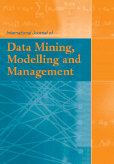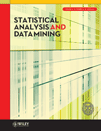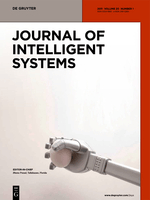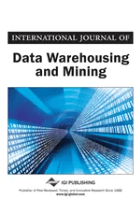
International Journal of Data Mining Modelling and Management
Scope & Guideline
Unveiling New Dimensions in Data Modeling and Management
Introduction
Aims and Scopes
- Data Mining Techniques:
The journal emphasizes various data mining techniques, including frequent pattern mining, clustering, and classification, aimed at extracting meaningful insights from large datasets. - Machine Learning Applications:
It covers a wide range of machine learning algorithms and their applications in different fields, such as healthcare, finance, and social media, showcasing the integration of machine learning with data mining. - Big Data Management:
The journal explores big data paradigms and solutions, including data pipeline development, data quality optimization, and data management frameworks, to effectively handle the complexities of large-scale data. - Interdisciplinary Research:
Research that bridges multiple disciplines, such as combining data analytics with social sciences, economics, and environmental studies, is a key focus area, promoting a holistic approach to data-driven decision-making. - Emerging Technologies:
The journal also emphasizes the impact of emerging technologies like deep learning, IoT, and natural language processing in advancing data mining and modeling methodologies.
Trending and Emerging
- Deep Learning Innovations:
There is a significant increase in publications focusing on deep learning techniques, particularly in applications related to image processing, natural language processing, and complex data analysis. - IoT and Cybersecurity:
Research exploring the intersection of IoT technologies and cybersecurity, including intrusion detection systems and data protection methodologies, has gained traction in response to rising security concerns. - Sentiment Analysis and Social Media Mining:
The journal has seen a rise in studies analyzing social media data for sentiment analysis, reflecting the growing importance of understanding public opinion and behavior through data. - Healthcare Applications:
There is an emerging trend in utilizing data mining and machine learning for healthcare applications, such as disease prediction and patient management, driven by the need for data-driven healthcare solutions. - Data Ethics and Governance:
Increasing attention is being paid to issues of data ethics, privacy, and governance, highlighting the need for responsible data management practices in research and application.
Declining or Waning
- Traditional Statistical Methods:
There has been a noticeable decrease in studies focusing solely on traditional statistical methods, as the field shifts towards more innovative and computationally intensive approaches like machine learning. - Basic Data Visualisation Techniques:
Publications that address basic data visualization techniques are less frequent, suggesting a move towards more complex and interactive visualization methods that integrate advanced analytics. - Niche Applications:
Research on niche applications of data mining, such as specific case studies in localized contexts, seems to be declining, possibly due to a preference for broader, more generalizable findings. - Static Data Analysis:
There is a waning focus on static data analysis techniques, as real-time data processing and analysis gain prominence, reflecting the industry's shift toward dynamic data environments. - Simple Predictive Models:
The journal has seen fewer contributions centered around simple predictive models, as researchers increasingly explore hybrid and ensemble methods that promise greater accuracy and robustness.
Similar Journals

Statistical Analysis and Data Mining
Harnessing Data for Groundbreaking ResearchStatistical Analysis and Data Mining is a leading journal published by WILEY, dedicated to exploring the latest advancements in statistical methods and data mining techniques. With an ISSN of 1932-1864 and an E-ISSN of 1932-1872, this journal serves as a significant platform for researchers and professionals in statistical analysis, computer science applications, and information systems. Covering a wide range of topics from innovative analytical methodologies to emerging data mining algorithms, the journal aims to disseminate high-quality research that contributes to the evolving landscape of data science. Ranked in the Q2 category for the fields of Analysis, Computer Science Applications, and Information Systems in 2023, it emphasizes its relevance and impact within academia. While it offers limited Open Access options, the insights shared in this publication are integral for those wishing to stay ahead in fast-paced research and data-driven industries. Since its inception in 2008 and continuing through 2024, Statistical Analysis and Data Mining invites submissions that reflect rigorous empirical research coupled with practical implications, making it a vital resource for the academic community.

Intelligent Data Analysis
Advancing the Frontiers of Intelligent Data AnalysisIntelligent Data Analysis is a highly regarded journal published by IOS Press, specializing in the fields of Artificial Intelligence, Computer Vision, and Pattern Recognition. With its ISSN 1088-467X and E-ISSN 1571-4128, the journal has been a cornerstone of scholarly communication since its inception in 1997, serving as a vital resource for researchers, professionals, and students engaged in advancing methodologies and applications in intelligent data analysis. The journal maintains its significance with impressive Scopus ranks, indicating its notable position within the academic community. Although currently not an Open Access journal, Intelligent Data Analysis offers a wealth of insights and findings, encouraging collaboration and knowledge exchange among its readership. With an impact factor reflective of its rigorous selection processes, the journal traverses a broad range of topics, contributing to ongoing discussions and innovations in its field. As the journal looks toward shaping future research until 2024 and beyond, it remains a pivotal platform for disseminating cutting-edge research and fostering academic inquiry.

Journal of Intelligent Systems
Exploring the Intersection of AI and Information SystemsThe Journal of Intelligent Systems, published by DE GRUYTER POLAND SP Z O O, is a premier open access journal that has been at the forefront of advancements in the fields of Artificial Intelligence, Information Systems, and Software Engineering since its inception in 1991. With a commitment to disseminating high-quality research, the journal has been recognized in the 2023 category quartiles as Q3 in these critical areas, reflecting its relevance and impact in the academic community. The journal serves as a vital platform for researchers, professionals, and students interested in the evolving landscape of intelligent systems, offering insights into innovative methodologies and applications. As an open access publication since 2020, it ensures that research is readily available to a global audience, fostering collaboration and engagement within the scientific community. With a Scopus rank in the 65th to 69th percentiles across its categories, The Journal of Intelligent Systems continues to contribute significantly to the discourse on intelligent technologies and their implications for the future.

Data Science and Engineering
Transforming research into real-world impact.Data Science and Engineering is a premier open access journal published by SPRINGERNATURE, dedicated to advancing the fields of data science, artificial intelligence, computational mechanics, and information systems. Since its inception in 2016, this journal has rapidly established itself as a leader in the academic community, boasting an impressive Q1 ranking in multiple computer science categories, including Artificial Intelligence, Software, and Information Systems. With a commitment to disseminating high-quality research, it caters to a diverse audience of researchers, professionals, and students eager to explore the intersection of data and technology. The journal's robust global reach, combined with its respected reputation, empowers authors to share their findings widely, facilitating breakthroughs and innovations across the digital landscape. Join the vibrant community of scholars contributing to this integral field of study, and stay informed with the latest research by accessing the journal freely online.

International Journal of Data Warehousing and Mining
Elevating Standards in Data Research ExcellenceInternational Journal of Data Warehousing and Mining, published by IGI Global, is a vital resource in the field of data management and analytics, catering to researchers, professionals, and students alike. With ISSN 1548-3924 and E-ISSN 1548-3932, this journal has been at the forefront of disseminating pioneering research since its inception in 2005 and will continue to do so through 2024. Despite its current categorization in the Q4 quartile for Hardware and Architecture as well as Software, and its Scopus rankings, the journal aims to foster innovation within the domains of data warehousing, data mining, and their applications across various sectors. The absence of an open access option does not diminish its significance; rather, it ensures that the journal maintains rigorous peer-review standards, providing high-quality research outputs that contribute to ongoing discussions and advancements within the field. Researchers and practitioners looking to stay updated on the latest trends and methodologies will find the International Journal of Data Warehousing and Mining an indispensable tool in their academic and professional endeavors.

KNOWLEDGE AND INFORMATION SYSTEMS
Bridging Theory and Practice in Information SystemsKNOWLEDGE AND INFORMATION SYSTEMS, published by SPRINGER LONDON LTD, is a distinguished journal in the field of information systems, artificial intelligence, and human-computer interaction. With its ISSN 0219-1377 and E-ISSN 0219-3116, this journal has built a robust reputation since its inception, featuring a convergence of valuable research from 2005 through 2024. Catering to a diverse academic audience, it is classified among the leading journals in its category, proudly holding a Q1 ranking in Information Systems and Q2 rankings in multiple other domains. The journal aims to publish cutting-edge research that not only advances theoretical understanding but also provides practical applications within these rapidly evolving fields. Although it is not an Open Access journal, subscribers can access a wealth of knowledge critical for researchers, practitioners, and students looking to enhance their expertise. With a 2023 Scopus rank placing it within the 66th percentile for Information Systems, KNOWLEDGE AND INFORMATION SYSTEMS is an invaluable resource for those committed to pushing the frontiers of knowledge in technology and information science.

DATA & KNOWLEDGE ENGINEERING
Pioneering Research in Data and Knowledge TechnologiesData & Knowledge Engineering is a prestigious, peer-reviewed journal dedicated to the fields of data management, information systems, and knowledge engineering. Published by Elsevier in the Netherlands, this journal serves as a critical resource for researchers, professionals, and students alike, offering a platform for high-quality, original research and innovative approaches in the realm of data-driven technologies and methodologies. With a considerable impact factor and classified in the Q2 quartile for Information Systems and Management, it ranks 47th out of 148 journals in its category, placing it in the esteemed 68th percentile according to Scopus metrics. Data & Knowledge Engineering covers a wide array of topics including database systems, data mining, and knowledge representation, ensuring that it remains at the forefront of advancing understanding and application in these dynamic fields. Engage with compelling articles and significant findings published since its inception in 1985, as the journal continues to shape the future of data-centric research up to 2024 and beyond.

Frontiers in Big Data
Fostering Collaboration Across Disciplines in Big DataFrontiers in Big Data, published by Frontiers Media SA in Switzerland, is a leading open access journal that has established itself as a vital resource for scholars and practitioners in the expanding realms of artificial intelligence, computer science, and information systems since its inception in 2018. With an impressive impact factor reflected in its Q2 rankings across multiple categories, including Artificial Intelligence, Computer Science (Miscellaneous), and Information Systems, this journal serves as a pivotal platform for disseminating groundbreaking research and promoting interdisciplinary collaboration. The journal's commitment to open access ensures that high-quality research is readily accessible to a global audience, fostering the exchange of innovative ideas and advancements in big data technologies. By creating an inclusive space for diverse perspectives, Frontiers in Big Data aims to bridge the gap between theoretical research and practical application, making it an essential read for anyone invested in the future of data science.

Wiley Interdisciplinary Reviews-Data Mining and Knowledge Discovery
Advancing interdisciplinary research in data mining and knowledge discovery.Wiley Interdisciplinary Reviews: Data Mining and Knowledge Discovery is a premier journal published by WILEY PERIODICALS, INC, dedicated to the rapidly evolving fields of data mining and knowledge discovery. Since its inception in 2011, this journal has emerged as a vital resource for researchers and practitioners alike, boasting an impressive Q1 ranking in the field of Computer Science (miscellaneous) as of 2023, and is recognized for achieving a remarkable 98th percentile in Scopus rankings. The journal aims to disseminate high-quality, interdisciplinary research that addresses the theoretical and practical implications of data mining techniques, innovative algorithms, and knowledge discovery paradigms. With a commitment to fostering knowledge exchange among academia and industry, Wiley Interdisciplinary Reviews is essential for those looking to remain at the forefront of data science advancements. Researchers and professionals will find relevant discussions, cutting-edge methodologies, and comprehensive reviews that contribute significantly to the field's development.

JOURNAL OF UNIVERSAL COMPUTER SCIENCE
Advancing global knowledge in computer science.JOURNAL OF UNIVERSAL COMPUTER SCIENCE, published by Graz University of Technology's Institute for Information Systems and Computer Media (IICM), stands as a pivotal resource in the field of computer science. Since its inception in 1994, this Open Access Journal has fostered a culture of knowledge sharing and collaboration, allowing readers from all corners of the globe to access cutting-edge research without barriers. With an impressive convergence of studies spanning from 1996 to 2024, the journal covers a breadth of topics within Computer Science, achieving a Q3 ranking in miscellaneous areas and a Q4 ranking in theoretical computer science as of 2023. It also holds significant standing in Scopus rankings, demonstrating its influence and reach among the scientific community. The journal is particularly valuable to researchers, professionals, and students eager to explore innovative ideas and techniques that push the boundaries of computer science. Based in Austria, the journal is dedicated to maintaining high standards of scholarly integrity while promoting interdisciplinary discourse and advancements in technology.